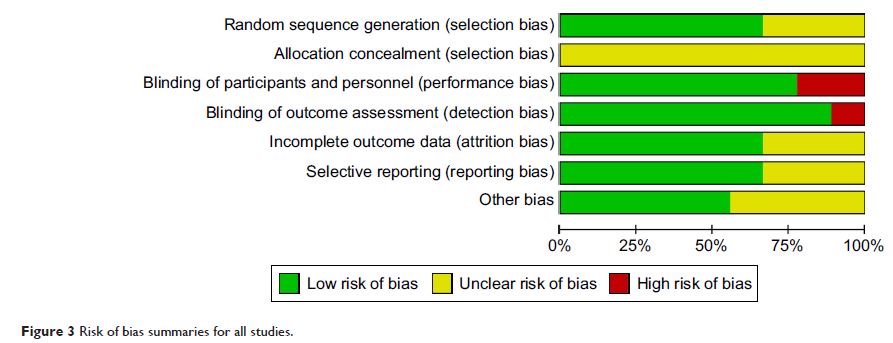108985
论文已发表
注册即可获取德孚的最新动态
IF 收录期刊
- 3.4 Breast Cancer (Dove Med Press)
- 3.2 Clin Epidemiol
- 2.6 Cancer Manag Res
- 2.9 Infect Drug Resist
- 3.7 Clin Interv Aging
- 5.1 Drug Des Dev Ther
- 3.1 Int J Chronic Obstr
- 6.6 Int J Nanomed
- 2.6 Int J Women's Health
- 2.9 Neuropsych Dis Treat
- 2.8 OncoTargets Ther
- 2.0 Patient Prefer Adher
- 2.2 Ther Clin Risk Manag
- 2.5 J Pain Res
- 3.0 Diabet Metab Synd Ob
- 3.2 Psychol Res Behav Ma
- 3.4 Nat Sci Sleep
- 1.8 Pharmgenomics Pers Med
- 2.0 Risk Manag Healthc Policy
- 4.1 J Inflamm Res
- 2.0 Int J Gen Med
- 3.4 J Hepatocell Carcinoma
- 3.0 J Asthma Allergy
- 2.2 Clin Cosmet Investig Dermatol
- 2.4 J Multidiscip Healthc

高频重复经颅磁刺激治疗抑郁症和帕金森病的有效性:随机对照临床试验的荟萃分析
Authors Qin B, Chen H, Gao W, Zhao LB, Zhao MJ, Qin HX, Yang MX
Received 10 November 2017
Accepted for publication 4 December 2017
Published 11 January 2018 Volume 2018:14 Pages 273—284
DOI https://doi.org/10.2147/NDT.S156695
Checked for plagiarism Yes
Review by Single-blind
Peer reviewers approved by Prof. Dr. Roumen Kirov
Peer reviewer comments 2
Editor who approved publication: Professor Wai Kwong Tang
Aim: This meta-analysis aimed to assess the effect of high-frequency repetitive
transcranial magnetic stimulation (HF-rTMS) for the treatment of depression in
patients with Parkinson’s disease (PD).
Methods: The design was a meta-analysis of randomized
controlled trials (RCTs). The participants were patients with PD who suffered
from depression. The interventions were HF-rTMS alone or in combination with
other treatments compared with sham-rTMS, placebo, and antidepressant
treatments. The primary outcome measure was changes in depressive symptoms,
defined as the mean change in the total depression score. The secondary outcome
was changes in motor symptoms, defined by Unified Parkinson’s Disease Rating
Scale part III scores, and the acceptability, defined as the risk of all-cause
discontinuation. These were expressed as mean differences (MDs), standardized
mean differences (SMDs), or risk ratios (RRs) with 95% confidence intervals
(CIs).
Results: We identified nine suitable trials, with data from 332
participants. For the patients with depression in PD, HF-rTMS was not better than
sham-rTMS (SMD =-0.33, 95% CI -0.83 to 0.17) or selective serotonin
re-uptake inhibitors (SSRIs) (SMD =0.07, 95% CI -0.52 to 0.18) for the
treatment of depressive symptoms. However, the motor benefits after treatment
with HF-rTMS might be better than sham-rTMS (MD =-2.80, 95% CI -5.45 to -0.15)
and SSRIs (MD =-2.70, 95% CI -4.51 to -0.90).
Conclusion: This meta-analysis provides some evidence that
in patients with PD with depression, HF-rTMS may lead to improvement in motor
function but not in depression compared with sham-rTMS or SSRIs.
Keywords: sham-repetitive
transcranial magnetic stimulation, selective serotonin re-uptake inhibitors,
depressive symptoms, motor symptoms
